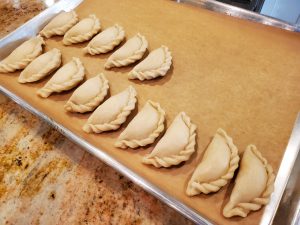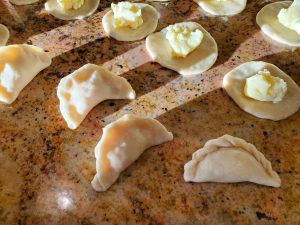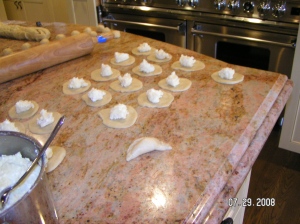 [1]
[1]Consumed in great quantities, loved by all, the flaky dough and flavorful fillings beckon you to eat yet another one, the irresistible Boreka [2]. Boreka may also be spelled Boureka or Bureka. Borekas are usually a savory, but occasionally sweet filled turnover. There are many kinds of dough and infinite variety of fillings. Versions can be found in Turkey, in fact Borek is a Turkish word, in Israel, and throughout the Middle East. Sephardic Jews, or broadly speaking those with Spanish origins, from Turkey and the Greek Island of Rhodes traditionally eat this dairy filled version at holiday lunches along with a long list of other traditional items. I have many fond memories of this as a child in Seattle. My borekas are petite and crisp with an intense cheese flavor but not too salty.
Yield 80-84 if you make dough twice
Filling:
1-large Russet baking potato, peeled
14 ounces Feta cheese [3], crumbled
10 ounces Monterey Jack cheese or Cheddar cheese, grated
2 ounces Kasseri cheese [4], grated
2 ounces Parmesan cheese, grated
3 extra-large eggs
Dough:
4 cups flour
2 teaspoons salt
1 cup ice cold water
3/4 cup vegetable oil, preferably safflower or sunflower
1 beaten egg for egg wash
2 ounces Parmesan cheese grated
Heat oven to 400°F.
Slice potato in ¼ inch slices, place in a medium sauce pan with enough water to cover and boil for about 15 minutes or until soft enough to mash. Drain and mash potato once it is soft enough. While potato is still hot, add feta cheese. Add other cheeses and use a potato masher to blend. Then, switch to a wooden spoon and add eggs and mix. The heat from the potatoes will melt the cheeses, but by the time, you add the eggs they will not cook. Set aside to cool while you prepare the dough or refrigerate up to one day until you have time to make them. Filling will stiffen as it cools.
For dough; combine flour and salt in a medium size mixing bowl. Whisk cold water and oil together in a two cup glass measure. Add liquid to flour. Gather dough together in a ball with your hands, making sure all is incorporated. Make two batches of dough for this amount of filling. Dough should be very pliable, yet be able to hold its shape, and easy to roll out but not sticky.
Separate each batch of dough into 42 walnut size balls. With your fingers roll balls until smooth. Smooth balls roll out easier and create a more uniform boreka. Roll each ball out to about a 3 inches in diameter using a wooden rolling pin. Take care not to roll rolling pin over edges of your circles or edges will be thin and centers thick.
To assemble borekas; place a tablespoon of filling in center of each circle of dough. Portion out filling to accommodate the 84 balls you have made. Fold the circles into half-moons. Pinch edges shut and twist the edge forming a rope design [5] (repulgo). To achieve the rope edge hold boreka in you left hand, edge side out, using you right thumb and index finger, pinch the left edge of the corner, give a little pull and fold it forward and seal to create the first scallop on the rope. Repeat as finely as possible across the edge to the right until you have an overlapping sealed edge of scallops. To complicated? To keep it simple, just seal the edges with the tines of a fork taking care not stretch the edge to thin.
You will need 4 one half sheet baking pans. Use silpat [6] liners or parchment paper if you like, and save some scrubbing. Place 21 borekas on each baking sheet (3 columns of seven). Space them evenly. Brush each one with egg wash, being careful not get egg on the baking sheet.
Sprinkle with grated Parmesan cheese. Bake approximately 15 to 20 minutes or until and golden. Remove from the baking sheets and place on cooling racks.
BOREKAS may be frozen and reheated. You can also freeze them before baking single layer on a cookie sheet and later transfer to a zip lock bag when frozen hard. Bake when needed.
 [8]
[8]


18 Comments To "Borekas With Potato And Cheese"
#1 Pingback By My Weekend in Chicago « The Boreka Diary On August 20, 2009 @ 11:36 AM
[…] « Previous Post […]
#2 Comment By Nurit – 1 family. friendly. Food. On October 26, 2009 @ 10:54 AM
These look great! And the filling sounds very tasty.
#3 Pingback By Folares for Purim On February 23, 2010 @ 12:17 PM
[…] of dough for cheese and potato borekas with the addition of 3/4 cup grated parmesan cheese to the […]
#4 Pingback By Spinach Fritada, Sephardic Style On September 3, 2010 @ 9:50 PM
[…] The meal consists of Huevos Haminados (a hard cooked egg with onion skins to turn them brown), Borekas, Boyuz, fish (either fried or oven baked with sauce), tomatoes, cucumbers, melons, grapes, berries, […]
#5 Comment By Jean at The Delightful Repast On September 28, 2010 @ 9:03 AM
Linda, wish we’d had a chance to chat at camp on Saturday. It was the first time I had ever heard of borekas–now they’re all I can think about! The Jewish version of the pasties and other savory pies of my English heritage. Can’t wait to try these cheese and potato ones.
#6 Comment By Amy Turiel Pavia On April 19, 2011 @ 8:27 PM
Hi Linda,
I simply cannot thank you enough for sharing this recipe for cheese and potato borekas. Like members of your family, my father’s parents were Sephardic Jews who emigrated from Rhodes. My dad grew up among extended family and other Rhodeslies in Brooklyn, NY and so, of course, grew up eating many of the traditional foods they brought with them from home. To help celebrate my dad’s 80th birthday, I wanted to make him borekas like the ones he ate growing up (and the ones I remembered eating as a child when I visited my grandfather or other relatives from “the old country”). I found recipes for borekas in various cookbooks but, until I found your website, didn’t find any that sounded like the ones we ate. When I read the recipe and saw the pictures, I knew I’d found what I was looking for. This past weekend, when my dad opened the wrapped container of boreka’s I made using your recipe, he literally swooned. He was so moved, he got teary-eyed; I’m not sure any other gift could’ve meant more to him. So, thank you from the bottom of my heart.
P.S. Maybe biscotios for Father’s Day??? 🙂
#7 Comment By Linda Capeloto Sendowski On April 20, 2011 @ 3:29 PM
Dear Amy, When I receive comments like yours I am so happy, thrilled and gratified, I guess this is why I write the blog. Thank you so much for your kind words. I noticed that your, I am assuming, maiden name was Turiel. My father’s mother, my grandmother was Esther Turiel then Capeloto.
#8 Comment By Rachel On December 1, 2011 @ 1:10 PM
Hello! I want to make this for a Hanukkah party I’m having – would they work as well shaped in a traditional boreka style (like these [9])?
Thanks!
rachel
#9 Comment By Rachel On December 1, 2011 @ 1:12 PM
OOPS! Meant to post this on this post: [10]
#10 Comment By Linda Capeloto Sendowski On December 1, 2011 @ 11:12 PM
Hi Rachel, Ok, I think I understand what you are asking. You could use the dough from the boyus recipe and fill them with potato cheese filling. Yes no problem, You could use the boreka dough and fill them with spinach and cheese, no problem. To make the dough of the boyus in the shape of borekas, I don’t think would work since boyus is a very thin dough like filo, and needs to be rolled to make layers. Boreka dough is like pie dough a ‘short’ crust that is thicker and bakes up crispy. Change the fillings around, but the shape is good for the individual kinds of dough. Have a wonderful Hanukah party. I am working on a menu and date for one also.
#11 Comment By Stella Nemeth On August 26, 2012 @ 8:59 AM
Thank you for the boreka recipe. My mother also came from Rhodes and the Turkish mainland just across the way. And since one of my Great Grandmothers was a Capoloto, who knows. I’m convinced that if you have Rhodes roots, you are all related to some extent, if you go back far enough.
#12 Comment By Melanie Curtis On November 11, 2012 @ 7:06 AM
Hello Linda, I love your site and have also become insane for borekas, much to the joy of some in my synagogue who have fond memories of them. Your pumpkin borekas are quite addicting! However, I made the potato-cheese borekas last night, and while they look gorgeous, they are rather dry. I had substituted sharp provolone for the kasseri cheese (could not find it where I live). Do you have any suggestions?
#13 Comment By A Bit of Brooklyn On January 14, 2013 @ 12:30 PM
These remind me of the borekas I get whenever I visit Israel… can’t wait to try out the recipe, thank you!
#14 Comment By Margaret Benbassat Motola On November 21, 2013 @ 10:01 AM
Hello Linda, Love your recipe for Borekas, l never used potatoes before… my folks were from Istanbul ( ‘stambol’) but went to England , London where l was born. Live her in Rhode Island for the past 40 years…. Im looking for a recipe for Tarama,but not made with the usual Cod roe, the roe my Mother used was a granular roe and it was not made as a puree, the grains were still very visible,in a sauce that was lemony and olive oil & l don’t know what else, maybe its not called Tarama, but thats all l knew it by… anyway l have never been able to find anyone who knows what lm talking about.. Im hoping you will have the answer… All the best, looking forward to hearing from you… Margaret…
#15 Comment By Margaret Benbassat Motola On November 21, 2013 @ 10:12 AM
Hello Linda. I am looking for a recipe for a particular kind of Tarama …. my Mom used to make it from the roe that was grainy not shad roe and it was not as a puree, you still saw the grains in a lemon and olive oil ( don’t know what else).. sauce… Hope you are able to help me in this quest….. Many thanks. Margaret
#16 Pingback By Food Prep for a 3 Day Holiday | Menu Plan, Haul, and Cook with Me | Shavuot 2022 – Easy Instant Pot Recipes On June 14, 2022 @ 12:41 PM
[…] Boreka Dough recipe [11] […]
#17 Comment By Marcelo Bruno Rodrigues On January 8, 2024 @ 1:56 PM
Hi, Linda! I have a recipe in which the dough requires olive oil and, after filling and folding the dough, it is glazed with egg yolk mixed with olive oil and sprinkled with Parmesan cheese before baking. Is it a good way for preparing the borekas? Greetings from Brazil!
#18 Comment By Linda Capeloto Sendowski On January 8, 2024 @ 10:07 PM
Hi Marcelo, that sounds delicious. Linda